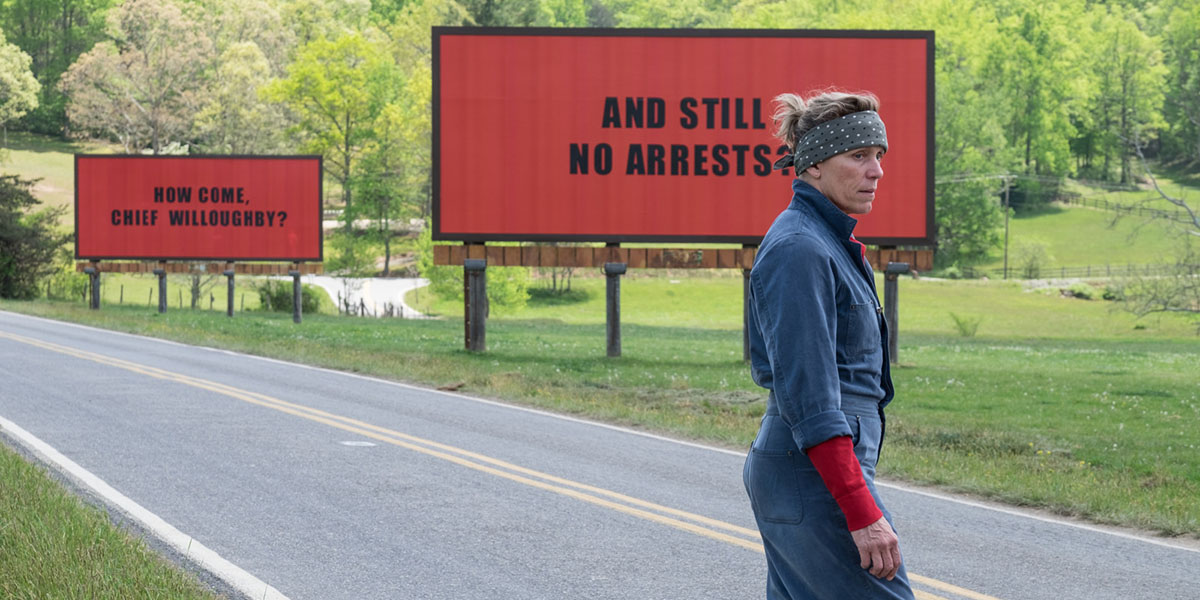Writer, director, and playwright Martin McDonagh has reached new heights and new ambitions with his latest effort “Three Billboards Outside Ebbing Missouri.” This is a strangely American story for the Irish filmmaker; a dark, rural noir about a community plagued by tragedy and bitter rivalries. The film’s dark sense of humor and colorful dialogue, as well as actress Frances McDormand as the lead, brings to mind bleaker work of the Coen brothers, and while “Three Billboards” isn’t quite as structurally sound or tonally confident as something like “Blood Simple” or “Fargo,” this Midwest murder ballad has its own eccentricities to boast.
McDormand stars as Mildred Hayes, a hardened town’s woman who is still in mourning after a year of waiting for the local police to solve the sexual assault and brutal murder of her teenage daughter. When it seems like the local authorities have exhausted all their leads and have let the case get cold, Mildred takes action by renting three un-used billboards on an old highway, calling out the police chief Bill Willoughby (Woody Harrelson) for his inaction. Sam Rockwell plays Jason Dixon, the hot-headed officer who works under Willoughby and whose reputation as an underachiever places him in a conflicting position between the locals, the vengeful Mildred, and his boss.
Speaking only for his cinematic work, McDonagh is one of the many filmmakers who graduated from the school of post-Tarantino, making bratty, self-conscious and genre-defying crime movies. In this regard, he shares a lot of same obsessions as his British crime comrades such as Matthew Vaughn (“Layer Cake”) and Guy Ritchie (“Snatch”), but where he departs from all of these influence, is his ability to be arch and ultra-violent while never losing sight of his interest in deep-rooted emotional storytelling. His debut “In Bruges” as well as “Three Billboards…” lets the flashy style and sassy dialogue carry us to unexpected tenderness flowing beneath the surface of his movies’ genre appeal. This latest work pushes the sincerity of its lurid subject matter even further and finds McDonagh dialing into his actors’ performances with more clarity and a new sense of Zen confidence. This is why it's all the more frustrating when the movie undercuts its emotional core with corny punchlines or crass jokes.
The majority of the film balances the dark humor and the darker tragedy with commendable grace and agility, but occasionally when these two tones run into each other, they loudly clang. “Game of Thrones” actor Peter Dinklage is essentially included in the cast for the sole purpose of delivering an extended little-person joke, and both Harrelson as Chief Willoughby and John Hawkes as Mildred’s abusive ex-husband are both sporting young trophy wives played by Abbie Cornish and Samara Weaving; a strange parallel that isn’t addressed and is often played for tonally-inappropriate laughs. Though McDonagh is stretching his abilities here and has perhaps made his most fulfilling and ambitious movie yet, the stretch-marks are definitely visible.
“Three Billboards Outside Ebbing Missouri” isn’t a perfect film but it’s a welcome surprise during the usually-stuffy prestige season. It’s a twisting crime yarn that you can never predict and that’s equally concerned with presenting the film as both an art-form as well as a means for populist entertainment. This is the director’s best-looking film to date, with cinematographer Ben Davis capturing the landscape in a way that informs the movie’s southern-gothic undertones perfectly. And yet, even with a bigger canvas being utilized, the performances never drift too far from the intimate relationship they successfully build with the audience.
Grade: B+
Originally published in the Idaho State Journal/Dec-2017
Listen to this episode of Jabber and the Drone to hear more conversation about "Three Billboards..."
Listen to this episode of Jabber and the Drone to hear more conversation about "Three Billboards..."

No comments:
Post a Comment